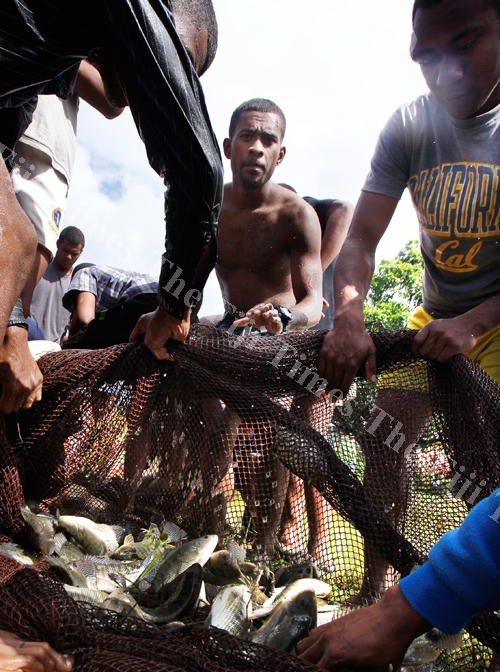PEOPLE often relate to life in boarding schools with meals such as rice and dhal or soup rice as these are popular dishes normally served at these institutions.
If you attended boarding school or are a boarder right now, you will know these dishes find it hard reaching our stomachs but after strenuous work weeding outside or scrubbing pavements, one will have no choice but to just gulp it all down or go hungry.
For each boarder at a government funded boarding school, their three meals a day amount to $2.10 which is a mere 70 cents per meal. It’s situations like these that have driven Ratu Kadavulevu School Old Boys (RKSOB) Association to join hands in trying to improve the quality of meals served for their younger brothers at Delainakaikai.
Members of RKSOB from the US have been the driving force in the recent agricultural and aquaculture project undertaken by students at the school. RSKOB project manager Jovesa Korovulavula, who hails from Mataso in Kadavu, said the recent project was tilapia fish breeding.
“We had initially brought 3500 tilapia fish for the three ponds and we have been feeding the fish with fish meal for the past five months now, so today is our first harvest,” Mr Korovulavula said on Friday, July 6. “Feeding the tilapia in one pond cost around $5000 and we are grateful to the RKSOB (USA Branch) for their support.”
Mr Korovulavula, who attended the school from 1987 to 1992, said he knew the support from the RKSOB would fade so they had another pool for breeding prawns. “Proceeds from the prawns will be used to pay off expenses for what is needed in breeding these tilapia fish as the fish will not be sold. Instead, they will be consumed by the boarders.”
Mr Korovulavula, who is an agriculture expert, said supporting such projects was a way of giving back to the school and also ensuring students know the value of being self-reliant.
He said the RKSOB Association was grateful to the Director of Fisheries for their assistance in getting the project started. RKS farm manager Navitalai Vakacokovanua, 52, said the tilapia project was an idea that started 10 years ago by Peace Corps volunteers who came to teach at the school.
“The idea was mooted by these volunteers and the RSKOB made it happen,” Mr Vakavakacokovanua said.
“It took us five months to harvest our first batch of tilapia today so that means by December or January when the new school year starts, we will harvest the next batch. “The tilapia fish will not be sold to outside markets, it is entirely for the students to consume as we try to provide a good source of protein for their meals and also have some form of food security for the school.”
RKS agriculture teacher Master Alifereti Korovulavula, who teaches Year 12 and Year 13 students, said the project was also a great help for students as they practised at the ponds whatever they were taught in the classrooms.
“In the long run, I am sure some of these students will take up fish breeding or other agricultural farming once they leave school,” Mr Korovulavula said.
“This is a good way of teaching students that income can be generated from the land if they put into practise all the different methods of farming taught here in school.”
Mr Korovulavula said the school also had a piggery, poultry farm, cattle breeding, kumala, cassava and vegetable plantations located at Saiyaro.
Agriculture student Soloveni Tora, 19, said having practical agricultural lessons made learning easier for him.
“I now realise, I can earn a living from farming and making use of the land and other natural resources that surrounds us,” Tora said.
“I intend to do something similar after I leave school but most importantly, I want to share what I have learnt here in school to those back in the village.”
RKS principal Pio Veivoli said he was grateful for the support from old boys in Fiji and abroad.
“I am thankful to the RKSOB for their help in such projects as it teaches the students and also the school to be self-reliant,” Mr Veivoli said.
“The tilapia harvested will feed the 850 boarders at the school for two meals.”
RKS is also venturing into other Way Forward Programs namely:
Meat and layer birds where they will breed chicken that boarders at the school can eat. The eggs will be sold to outside markets for maintaining the chicken farm; and
Dalo farming where agriculture students plant dalo to supply FMF for their dalo or taro chips and also for consumption at the school.




